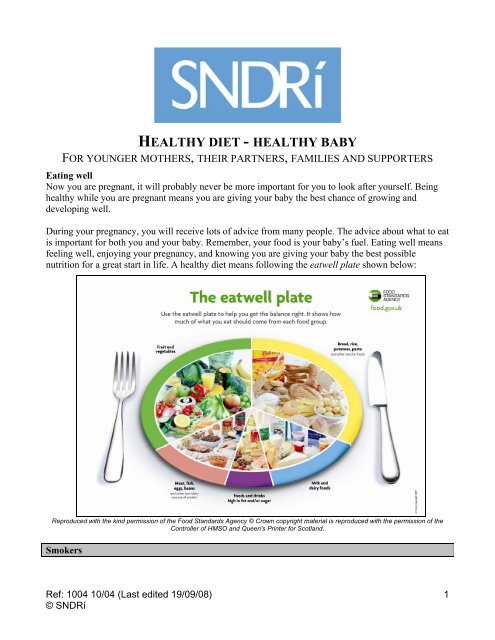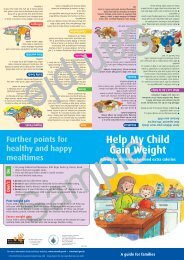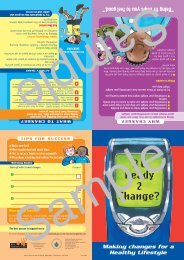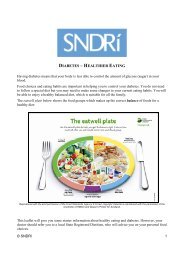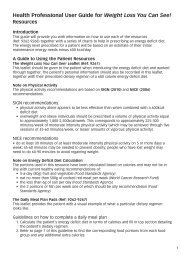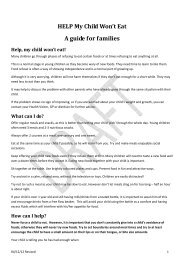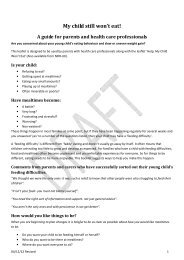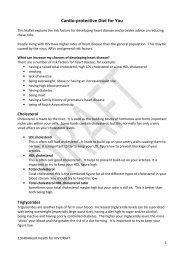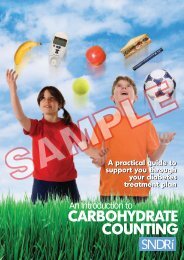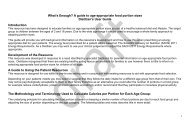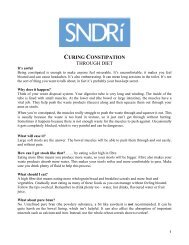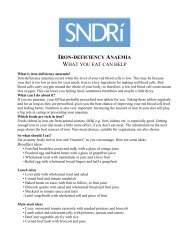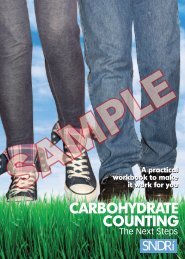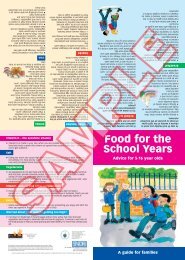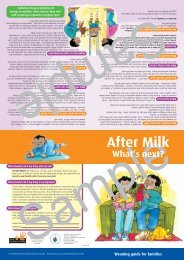HEALTHY DIET - HEALTHY BABY - NDR-UK
HEALTHY DIET - HEALTHY BABY - NDR-UK
HEALTHY DIET - HEALTHY BABY - NDR-UK
You also want an ePaper? Increase the reach of your titles
YUMPU automatically turns print PDFs into web optimized ePapers that Google loves.
<strong>HEALTHY</strong> <strong>DIET</strong> - <strong>HEALTHY</strong> <strong>BABY</strong><br />
FOR YOUNGER MOTHERS, THEIR PARTNERS, FAMILIES AND SUPPORTERS<br />
Eating well<br />
Now you are pregnant, it will probably never be more important for you to look after yourself. Being<br />
healthy while you are pregnant means you are giving your baby the best chance of growing and<br />
developing well.<br />
During your pregnancy, you will receive lots of advice from many people. The advice about what to eat<br />
is important for both you and your baby. Remember, your food is your baby’s fuel. Eating well means<br />
feeling well, enjoying your pregnancy, and knowing you are giving your baby the best possible<br />
nutrition for a great start in life. A healthy diet means following the eatwell plate shown below:<br />
Reproduced with the kind permission of the Food Standards Agency © Crown copyright material is reproduced with the permission of the<br />
Controller of HMSO and Queen's Printer for Scotland.<br />
Smokers<br />
Ref: 1004 10/04 (Last edited 19/09/08)<br />
© S<strong>NDR</strong>í<br />
1
You may already know that the poisons from smoke are passed to your baby. The most important thing<br />
you can do for your baby’s health is to stop smoking. Many mums – and dads - stop smoking during<br />
pregnancy. Ask your midwife or doctor for help.<br />
Being a teenager means you’re still growing yourself. So you need good nutrition for yourself as well<br />
as your baby. Here is special information for teenagers who are pregnant.<br />
Try to eat:<br />
Three regular meals a day – breakfast, lunch and tea - and healthy snacks in between.<br />
• A wide variety of foods.<br />
• Plenty of fruit and vegetables (fresh, frozen, tinned or dried). Aim to have at least 5 portions a day,<br />
including just one as a glass of fresh fruit juice.<br />
• Foods rich in folic acid which help reduce the risk of spina bifida (spine damage) in your baby.<br />
Foods to eat include bread, cereals, green leafy vegetables, peas and beans. For the first 12 weeks of<br />
your pregnancy, also take a folic acid tablet every day.<br />
• Plenty of starchy foods like bread, breakfast cereals, potatoes, pasta and rice. Have one of these at<br />
every meal. Choose high fibre types whenever you can. Whole wheat or multi-grain bread,<br />
wholegrain breakfast cereals like Weetabix, Shredded Wheat or bran flakes and jacket potatoes are<br />
ideal.<br />
• Drink plenty of fluids – at least 6 to 8 cups a day – to work with the fibre and prevent constipation.<br />
Water is the most healthy choice.<br />
• Calcium rich dairy foods, at least three times a day. This includes milk, yoghurt and cheese. Hard<br />
cheese like Cheddar or Cheshire, cheese slices or triangles or cottage cheese are good choices. If you<br />
don’t eat dairy foods, choose soya alternatives. Make sure they are the calcium enriched brands.<br />
• Protein foods two or three times a day. This includes lean meat (e.g. ham, beef), chicken, fish (e.g.<br />
tuna*, cod and salmon), eggs and pulses (e.g. lentils, chickpeas or beans including canned baked<br />
beans). If you do not eat meat, make sure you have eggs and pulses instead, for the iron they contain.<br />
*Limit tuna to twice a week because of its high mercury content.<br />
Healthy snacks? If you’re stuck for healthy snack ideas, here are few suggestions:<br />
• Cheese and pickle sandwich<br />
• Bread sticks dipped in cheese spread or hummus<br />
• Wholewheat crackers with cheese or ham<br />
• Pitta bread filled with tuna and sweetcorn<br />
• A bowl of breakfast cereal with milk<br />
• Yoghurt with sliced banana<br />
• Tomato, carrot or lentil soup or broth<br />
• Dried fruit like apricots or raisins<br />
• Fresh fruit like bananas, apples, pears, oranges, grapes<br />
• Tinned fruit like mandarin oranges or peaches, with yoghurt<br />
• Scones<br />
Meal ideas?<br />
Here are a few. You’ll probably also have your own favourites to add.<br />
• Tuna bake (tuna, sweetcorn and cheese sauce mixed with cooked pasta)<br />
• Beef stew made with all your favourite vegetables and potatoes or bread<br />
• Scrambled egg (cooked until solid) with tomatoes and whole-wheat toast<br />
• Fish fingers, oven chips, peas and sweetcorn<br />
Ref: 1004 10/04 (Last edited 19/09/08)<br />
© S<strong>NDR</strong>í<br />
2
• Baked beans on toast<br />
• Sausage casserole (sausage cooked with onions, potatoes and a mixture of vegetables)<br />
• Cheese and onion omelette cooked until all the egg is solid, with baked potato and carrots<br />
• Spaghetti bolognaise (made with tinned tomatoes and chopped carrots in the meat)<br />
• Chicken casserole with boiled potatoes and broccoli<br />
• Ham risotto (cooked rice mixed with chopped ham, onions, peas and sweetcorn)<br />
• Pizza topped with tomato, peppers, mushroom, onion and cheese, served with a side salad<br />
• Lasagne (meat, tuna or vegetable) with baked potato and salad<br />
• Roast dinner with lots of vegetables and all the trimmings<br />
• Shepherds pie with carrots and broccoli<br />
• Cauliflower cheese with crusty bread<br />
If you buy ready meals, try to choose those with added vegetables or serve your own vegetables or<br />
salad with them. Remember to re-heat them, so they are piping hot.<br />
Eat Safe<br />
Remember that for safety reasons, there are certain foods you must NOT eat while you are pregnant.<br />
They may carry listeria or salmonella, germs or bugs that can damage your baby. The foods you should<br />
avoid are:<br />
1. Pre-cooked or ready-prepared cold foods which will not be reheated. This means things like<br />
shop bought mixed salads (e.g. coleslaw, potato salad), paté, (meat or vegetable), quiches and<br />
cold meat pies or pasties.<br />
2. Undercooked meat or chicken, sausages or burgers – make sure they are not pink in the<br />
middle.<br />
3. Raw eggs and soft cooked eggs – make sure the yolk is solid.<br />
4. Soft ripened cheeses like Camembert, Brie, and blue veined cheese like Danish Blue and<br />
Stilton.<br />
5. Un-pasteurised milks – make sure any milk you drink is pasteurised.<br />
6. Soft or whipped ice cream from a counter or van.<br />
There are some other foods you should be cautious about, for different reasons:<br />
7. Avoid liver, liver pâtė and liver sausage – they are so rich in Vitamin A, they can harm your<br />
baby.<br />
8. Raw meat and raw poultry – take care where you put it in the fridge or when you handle it,<br />
because bugs may cross over from your hands, to other foods you eat. Wash your hands well<br />
after touching raw meat.<br />
9. Hot pies, pasties and sausage rolls at the hot counter can harbour bugs or germs, so make sure<br />
they are piping hot.<br />
10. Tuna fish contains mercury from the pollution in the sea, and this can damage your baby’s<br />
nervous system. Eat 2 portions a week in sandwiches or a salad, but no more.<br />
11. Peanuts – if you or your partner or a close family member suffers from any allergy, asthma,<br />
eczema, or Hayfever, you should avoid peanuts and peanut containing foods while you are<br />
pregnant and breastfeeding. This will reduce the chance of your baby being allergic.<br />
Drinks Water is the safest and most healthy drink – and it’s free! Diluted squash or juice is fine and<br />
milk shakes or milky hot chocolate are a good way for you to get your calcium. Tea and coffee These<br />
contain caffeine, which, in large amounts, can damage your baby or cause a miscarriage. Limit yourself<br />
Ref: 1004 10/04 (Last edited 19/09/08)<br />
© S<strong>NDR</strong>í<br />
3
to 1-2 mugs of coffee and 2 mugs of tea a day - or less if you can. You may like to try fruity or herbal<br />
teas for a change, which are caffeine-free.<br />
Cola and high energy drinks<br />
These are especially high in caffeine – even diet cola. Limit yourself to just 2 cans a day – or cut them<br />
out altogether if you can.<br />
Alcohol<br />
Drinking alcoholic drinks when you are pregnant may affect the health of your baby. Drink no more<br />
than 1 or 2 units of alcohol, just once or twice a week. One unit usually means the smallest measure<br />
you can buy in a pub - for example - 1 small glass of wine, ½ pint of beer, lager or cider, or one shot of<br />
spirit like vodka.<br />
Not feeling great? A lot of pregnant women say they feel very tired and slightly ‘off colour’,<br />
especially in the first few weeks and months. If you feel sick or are suffering with constipation or<br />
indigestion, ask your midwife or doctor for advice.<br />
This information has been produced for S<strong>NDR</strong>í by Registered Dietitians and other relevant health<br />
professionals. At the time of publication the information contained within the leaflet was, to the best of<br />
our knowledge, correct and up-to-date. Always consult a suitably qualified dietitian and/or your GP on<br />
health problems. S<strong>NDR</strong>í cannot be held responsible for how clients/patients interpret and use the<br />
information within this resource.<br />
Ref: 1004 10/04 (Last edited 19/09/08)<br />
© S<strong>NDR</strong>í<br />
4


